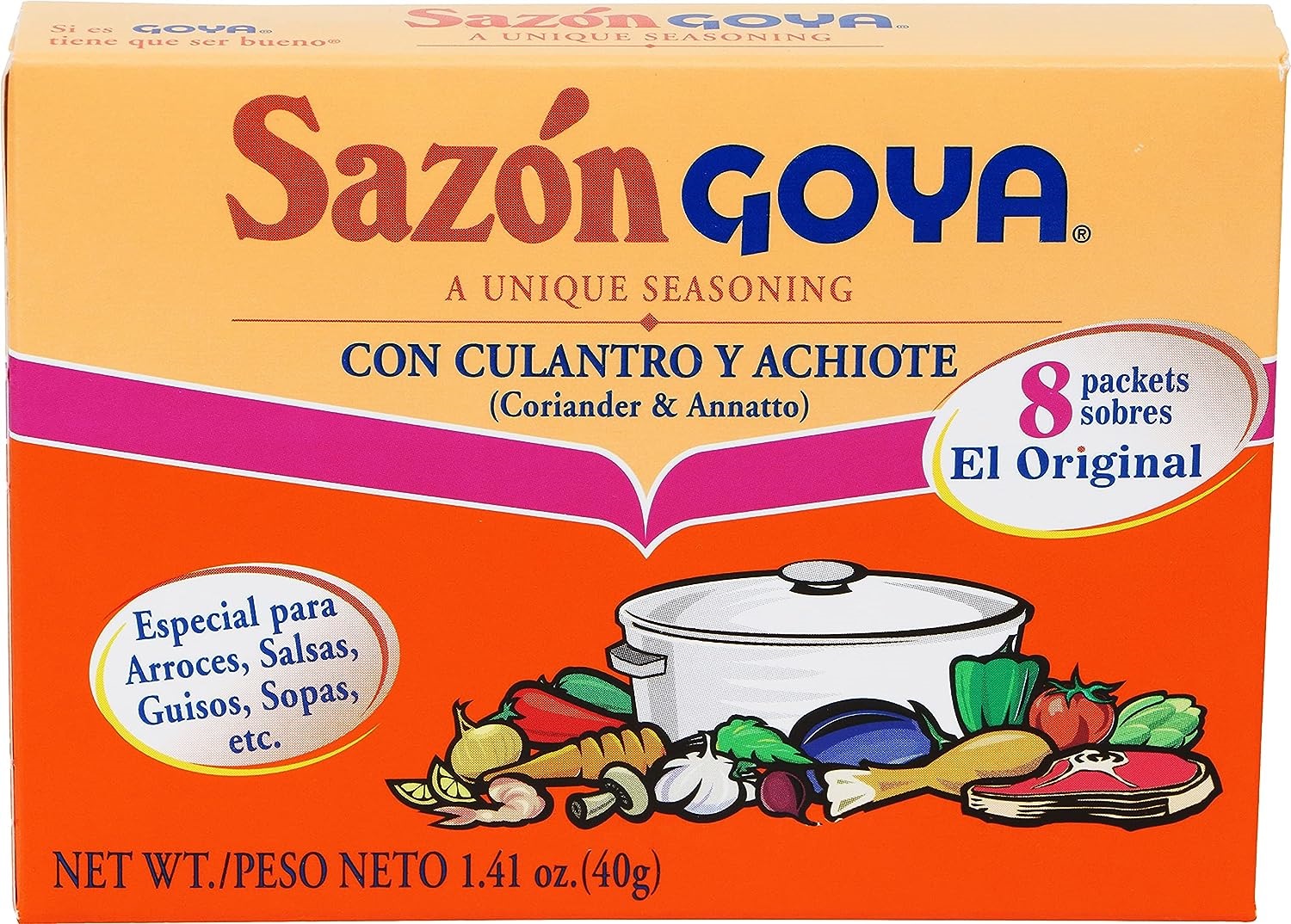
Sazon, a popular seasoning blend commonly used in Latin American cuisine, is not only known for its vibrant flavors but also for its nutritional benefits. Made with a combination of various herbs, spices, and sometimes even dehydrated vegetables, Sazon adds a burst of flavor to dishes like rice, stews, and meats. It’s not only delicious but also offers a range of health benefits.
In this article, we will explore the nutrition facts of Sazon and why it can be a valuable addition to your culinary repertoire. From its low calorie and fat content to its rich source of vitamins and minerals, Sazon provides a flavorful way to enhance your meals while adding nutritional value. So, let’s dive in and discover the hidden benefits of this popular seasoning blend!
Key Takeaways:
- Sazon is a flavorful seasoning blend that adds color and essential nutrients to dishes, but it’s important to use it in moderation due to its sodium content.
- Whether store-bought or homemade, Sazon offers a versatile and gluten-free way to enhance the taste of various recipes, allowing for personal customization and culinary creativity.
Sazon adds flavor and depth to dishes.
Sazon is a versatile seasoning blend used in various cuisines to enhance the flavor of dishes. It consists of a combination of spices, herbs, and salt, creating a unique and savory taste profile. Whether it’s sprinkled on meat, vegetables, or rice, Sazon brings a burst of flavor to every bite.
Sazon contains essential nutrients.
One of the remarkable aspects of Sazon is that it not only adds flavor, but it also provides essential nutrients. This seasoning blend is typically made with a variety of spices like garlic, onion, cumin, and paprika, which are rich sources of vitamins, minerals, and antioxidants. Consuming Sazon can be a delicious way to incorporate these beneficial nutrients into your diet.
Sazon enhances the color of your dishes.
Another interesting aspect of Sazon is its ability to enhance the color of your dishes. The addition of vibrant spices like annatto gives Sazon its characteristic reddish-orange hue, making your meals visually appealing. This adds a pop of color and presentation to your culinary creations.
Sazon can be a source of sodium.
While Sazon is an excellent flavor enhancer, it is important to note that it can contain a significant amount of sodium. The seasoning blend often includes salt as one of its main ingredients. Therefore, it is advisable to use Sazon in moderation, especially for individuals who need to limit their sodium intake due to health concerns.
There are low-sodium alternatives to Sazon.
For those looking for a lower-sodium option, there are low-sodium alternatives to traditional Sazon available in the market. These alternatives use salt substitutes or reduce the amount of salt used in the blend while still offering the same delicious flavors. Opting for these alternatives can be a healthier choice for individuals with specific dietary needs.
Sazon is widely used in Latin American and Caribbean cuisines.
Sazon has become a staple in Latin American and Caribbean cuisines. It is commonly used in dishes like rice and beans, stews, soups, and marinades. The unique flavor profile of Sazon adds an authentic touch to these traditional recipes, making it a favorite among those who enjoy the rich and vibrant flavors of these regions.
Sazon can be homemade or store-bought.
Sazon can be easily prepared at home using a combination of spices and herbs. However, it is also readily available in stores in pre-packaged form, making it a convenient option for those who want to save time in the kitchen. Whether homemade or store-bought, Sazon offers a quick and easy way to elevate the taste of your dishes.
Sazon can be used in a variety of recipes.
The versatility of Sazon allows it to be used in a wide range of recipes. From seasoning grilled meats and vegetables to flavoring rice, beans, and even dips, Sazon adds a touch of complexity and depth to any dish. Its ability to enhance multiple flavors makes it a must-have spice blend in every kitchen.
Sazon can be a gluten-free seasoning option.
For individuals with gluten sensitivities, Sazon can be a gluten-free seasoning option. However, it is essential to read the ingredient labels of store-bught Sazon carefully, as some brands may include additives or fillers that contain gluten. Alternatively, making your own Sazon at home using gluten-free spices ensures that it is safe for gluten-sensitive individuals.
Sazon can be customized to suit personal preferences.
One of the advantages of Sazon is its versatility, allowing it to be customized to suit individual tastes and preferences. Whether you prefer a spicier blend with the addition of chili powder or a milder version by reducing certain spices, Sazon provides the opportunity to experiment and create your version of this beloved seasoning blend.
Sazon can be a tool for culinary creativity.
With its unique blend of flavors and versatility, Sazon can be a valuable tool for culinary creativity. It opens up a world of possibilities to elevate your dishes, experiment with different cuisines, and create exciting flavor combinations. Let your imagination run wild and embrace the culinary adventure that Sazon can take you on.
Conclusion
In conclusion, sazon is a popular seasoning that adds a burst of flavor to various dishes. Not only does it enhance the taste of the food, but it also provides nutritional benefits. Sazon typically contains a blend of spices and herbs, including ingredients like garlic, cumin, coriander, paprika, and turmeric. These ingredients offer a range of health benefits, such as antioxidant properties, anti-inflammatory effects, and potential digestive benefits.When using sazon in your cooking, it’s essential to choose options that are low in sodium and free from artificial additives. This will ensure that you can enjoy the flavor without compromising your health. Remember to use sazon in moderation, as it can be quite potent.So, next time you’re looking to elevate your dishes with a burst of flavor, reach for sazon. Not only will it give your meals a delicious taste, but it will also contribute to your overall well-being.
FAQs
1. What is sazon?
Sazon is a seasoning typically used in Latin American and Caribbean cuisine. It is a blend of various spices and herbs, which vary depending on the brand and recipe.
2. Is sazon healthy?
Sazon can provide nutritional benefits due to the spices and herbs it contains. However, it’s important to choose options that are low in sodium and free from artificial additives.
3. How do I use sazon?
Sazon can be used to add flavor to a wide variety of dishes, such as rice, stews, soups, and grilled meats. Simply sprinkle the seasoning on the food while cooking or add it during the marinating process.
4. Can sazon be used as a substitute for salt?
Yes, sazon can be used as a flavor enhancer and can help reduce the amount of salt needed in a dish. However, it’s important to be mindful of the sodium content in the sazon you’re using.
5. Are there any health concerns with sazon?
Some commercial sazon brands may contain high levels of sodium and artificial additives. It’s best to read the labels and choose options that are low in sodium and free from artificial additives.
Was this page helpful?
Our commitment to delivering trustworthy and engaging content is at the heart of what we do. Each fact on our site is contributed by real users like you, bringing a wealth of diverse insights and information. To ensure the highest standards of accuracy and reliability, our dedicated editors meticulously review each submission. This process guarantees that the facts we share are not only fascinating but also credible. Trust in our commitment to quality and authenticity as you explore and learn with us.


